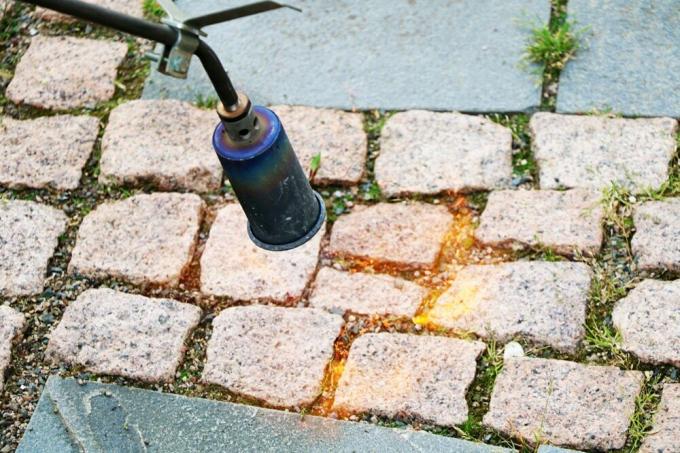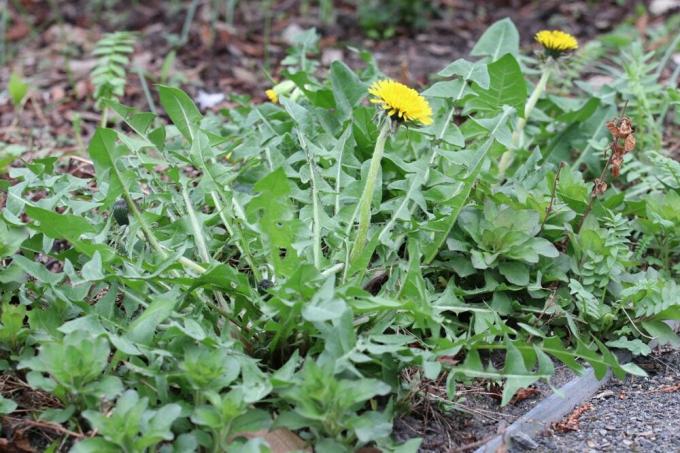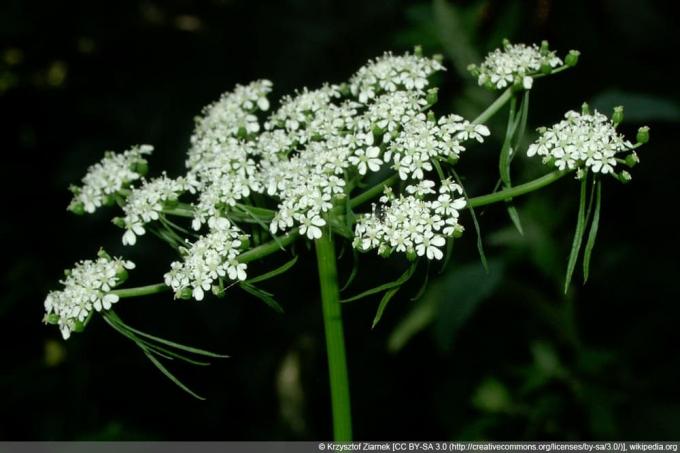

Table of contents
- hydrochloric acid
- saline solution
- Vinegar
- alternatives
- tear out
- burn down
- Weed?
- Responsibility
There are a whole range of home remedies and insider tips that are said to put an end to weeds once and for all. These include salt, vinegar, and even hydrochloric acid. Correct is: The means destroy weeds. Unfortunately, they also damage other plants and can lead to significant soil changes. In the worst case, not only the weeds are dead, but the entire garden.
hydrochloric acid
Diluted hydrochloric acid dissolves limescale from bathroom tiles and mortar residue from stones. It should also help against the weeds in the garden. That's right, weeds can be effectively controlled with hydrochloric acid. It is also easy to get in diluted form relatively cheaply in any hardware store. Nevertheless, you should keep your hands off it when it comes to weed killing. The aggressive acid not only kills the weeds, but also other plants in the immediate vicinity. Above all, however, it penetrates the soil and destroys the microorganisms contained therein. Depending on the concentration, it also changes the pH value. Both can cause long-term damage to soil quality. This is another reason why the use of hydrochloric acid in the garden is prohibited. Anyone who uses them anyway runs the risk of being fined a lot.
saline solution
If muriatic acid isn't allowed in the garden, it might be a good idea to use a saline solution to control weeds. After all, both are not the same. It's just stupid that salt or a saline solution is effective against weeds, but also attacks other plants. In addition, both variants have a significant impact on the pH value of the soil. The use of salt or a saline solution in the garden is therefore also prohibited and subject to high fines. The legislator is primarily concerned with the long-term protection of the natural foundations of life. Garden owners should always be aware that salt not only gets on the weeds, but also on other plants. It dissolves in moist soil and in this way spreads over a relatively large area - even when used in a targeted manner.
Vinegar

In addition to hydrochloric acid and salt, vinegar is repeatedly mentioned as a reliable and effective home remedy for combating weeds, unwanted bamboo and rampant ivy. But the same applies to vinegar: in the kitchen yes, in the garden no. Acetic acid is generally permitted as a plant protection product, but only in certain concentrations and no more than twice a year. The vinegar solution penetrates the plant through the cell membranes and causes it to die. However, the plants in the immediate vicinity are also affected. And the soil also suffers from an unwanted change in pH for the worse. That's why you should definitely keep your hands off vinegar for weed control. What is advertised as a proven home remedy usually does more harm than good.
Tip:
If vinegar or If acetic acids are to be used for weed control, then you should only use ready-made mixtures from specialist shops. A self-made vinegar solution is an illegal pesticide.
alternatives
If the home remedies hydrochloric acid, salt and vinegar in destroying weeds in the garden such are problematic and mostly forbidden, the question naturally arises as to what alternatives there are could give. These actually exist - but they are always associated with work and a relatively large amount of time. Two variants have established themselves as really effective solutions against weeds. On the one hand, there is tearing it out by hand. On the other hand, weeds can also be targeted with fire or destroyed with a gas burner.
tear out
It is a very laborious, but also a very effective way of weed control. It is particularly recommended when there are other, wanted plants in the immediate vicinity of the weeds. Especially in vegetable beds, flower beds and on lawns, there is actually no way around this method. The weeds must always be removed with the entire root and best disposed of in the dustbin. Incidentally, scraping out the joints between paving stones is nothing more than tearing them out. Here, too, the unwanted plant growth is scraped out completely with the roots.
burn down

Weeds that have spread on garden paving, walls, path borders and paths are best combated with fire. To do this, get a gas burner from the hardware store. With it, the entire plant is literally torched. However, it is important that the method is only used if there are no combustible materials in the immediate vicinity, otherwise there is a considerable risk of fire. This variant also requires some patience. It is not enough that the visible part of the plant is burned. Rather, you should hold the burner in one place on the affected area for a longer time in order to be able to destroy the roots underneath as well.
Weed?
Some hobby gardeners tend to have a garden that has to be so clean and tidy that it actually has nothing to do with nature. Yes, weeds are annoying and under certain circumstances can also impair the growth of desired plants. But so-called weeds are also part of nature. It doesn't always have to be a swept garden. One can also enjoy a so-called wild garden. Then the weeds don't bother you either, you can save yourself fighting them or at least reduce them to an absolute minimum.
Responsibility
Anyone who feels compelled to fight weeds, bamboo and ivy should always do so with the greatest possible responsibility. Salt and vinegar are touted as home remedies. This suggests that this is a completely natural way of weed control. However, as we have seen, the consequences can be dramatic. The situation is very similar with the artificially produced hydrochloric acid. Anyone who sees their garden as a natural habitat will do their best to keep their hands off these tools - in their own interest. And of course he will also comply with the legal requirements, which have not been set up without reason. There is no such thing as a miracle cure for weeds.
 garden editorial
garden editorial I write about everything that interests me in my garden.
Learn more about weed control - weed control in the garden

Japanese knotweed: 11 remedies to combat it
Japanese knotweed allows areas to be greened quickly. However, the rapid growth makes the creeper a problem in nature. We've rounded up 11 ways to combat the invasive species.

remove dandelions | 7 Tips to Destroy, Get Rid of & Eliminate
The dandelion is a feast for the eyes only in fairy tales. In the garden, on the other hand, it turns out to be an annoying weed. You want one thing above all: get rid of him quickly. However, it is not that easy. How to fight him is here.

Recognizing dog parsley & avoiding confusion | Is she poisonous?
Parsley is one of the most important herbs in the kitchen and is often grown in the garden. In addition to the edible parsley, there is also a wild relative, the dog parsley. It looks confusingly similar to the edible version, but it is poisonous and can even be fatal in large quantities.

Where are weed killers banned? That's what the law says...
Weed killers are practical - but not allowed everywhere. Where are they banned and what does the law say about them? We inform hobby gardeners about the most important rules for plant protection and legal, natural alternatives for weed killing in their own garden.

Removing Weeds: 9 Effective Sidewalk Remedies - Salt/Vinegar Info
Moss and weeds like to sprout in the joints of the paved garden paths. So the sidewalk, the driveway and also the terrace become an unkempt eye-catcher. But there are many effective ways to clean the paths and this does not necessarily require the chemical mace.

Vinegar and vinegar essence against weeds - suitable as weed killers?
There are a number of home remedies for weed control. They are considered a gentle alternative to chemical products and should therefore be harmless to the soil and the environment. Vinegar is also one of the natural products that are often used against weeds. Especially the concentrated form of vinegar, the vinegar essence, promises fast results.



